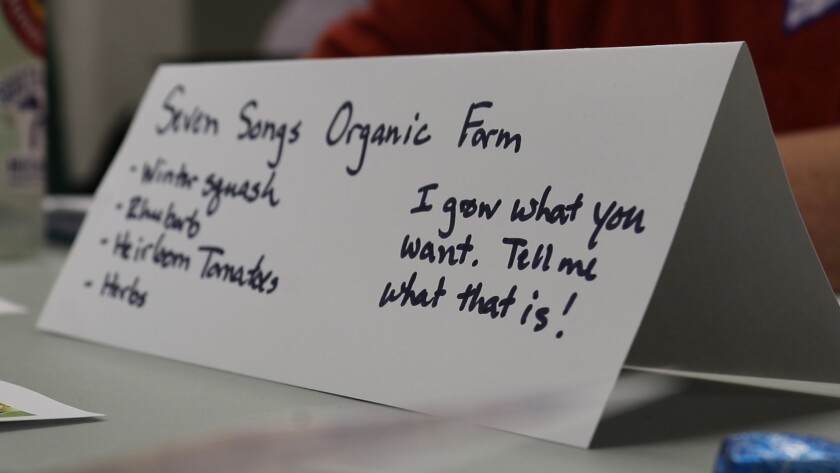ROCHESTER, Minn. — Across the state, Minnesota farmers looking to expand market opportunities, and school and early care providers who want to incorporate more locally grown foods in their meal programs are meeting face-to-face to see if there's a connection to be made.
Those relationships are being built at Minnesota Farm to حلحلآ» Roadshows, which are free and organized by Renewing the Countryside, Minnesota Department of Agriculture, Minnesota Department of Education and University of Minnesota Extension.
ADVERTISEMENT
The second of six Minnesota was held at the University of Minnesota Extension office in Rochester on Feb. 7. Attendees left the roadshow with a supply and demand spreadsheet along with a list of other resources.
co-founder of Renewing the Countryside, described the roadshows as a form of "speed-dating" for local producers and institutions.
"The method that we use here is kind of like a speed-dating model, where you get to talk to someone face-to-face for a very short amount of time, and give them a little bit of your history, what you produce, and maybe something special that you do," Olson said.
Things that could be overheard during the Feb. 7 event were school district employees asking farmers questions like "What products do you grow?" and "Can you deliver?"
Farmers asked buyers things like "Who does the ordering?" and "What are your kitchen capabilities?"
Kate Seybold is the Farm to Institution Coordinator for the Minnesota Department of Agriculture. She said the roadshows offer a chance for producers to form relationships with school districts and early care providers.
"We've heard from both producers and schools that there's a lot of value in just being able to make those initial connections in-person, in the same room, and so we wanted to create a space for people to come together and make those connections," Seybold said. "While we're at it, let's give them some training on how to build effective relationships and help kind of talk the same language."
ADVERTISEMENT
Several of the buyers' representatives in the room on Feb. 7 were recipients of the state's AGRI Farm to حلحلآ» Grant program. Seybold said the department is hearing success stories from those grants, including one district which started by working with two local producers and is now working with 14 producers.
"Another district shared that they were working with five local producers last year, and are now purchasing from 27 this year," she said. "The purpose of that grant program is to help increase the amount of Minnesota grown and raised foods that are making their way into federal meal programs in schools and early cares, and to be providing support to our Minnesota producers."

Sara George is the farmer-focused program manager for along with the operator of a small farm in Pepin, Wisconsin. She said sometimes it's hard for producers to know the right contact for getting their products into institutions like schools.
"The schools don't have capacity to have contact with all the farmers, and the farmers don't have capacity to leave the farm, and they're really not sure who to reach out to at the school — sometimes it's the food service director, sometimes it's the principal or the superintendent that's pushing these initiatives," George said.
She said farmers can be intimidated to work with a school that has hundreds or thousands of kids to feed daily, but they shouldn't be.
"You don't have to feed all thousand students, and maybe it's one meal a month," she said. "Or maybe it's in the salad bar, where they're utilizing the food."
After surveying 36 different institutions, George shared the top five obstacles that buyers of local foods face: connecting with farmers, consistency, reliability, delivery and pricing. She was surprised to find out that many of the institutions didn't know it was allowed for them to purchase directly from a farm.
ADVERTISEMENT
"Twenty-six of the 36 institutions I spoke to stated that they didn't know you can buy from local farms," George said. "If you take nothing else from today, product of the farm is legal. Farmers grow local foods. That's where food comes from."
For farmers, the top obstacles were: relationship development, quantities, time away from the farm, pricing uncertainties and marketing limitations.









